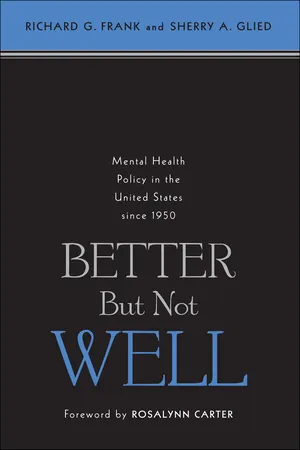
Better But Not Well
Mental Health Policy in the United States since 1950
- English
- ePUB (mobile friendly)
- Available on iOS & Android
Better But Not Well
Mental Health Policy in the United States since 1950
About this book
The past half-century has been marked by major changes in the treatment of mental illness: important advances in understanding mental illnesses, increases in spending on mental health care and support of people with mental illnesses, and the availability of new medications that are easier for the patient to tolerate. Although these changes have made things better for those who have mental illness, they are not quite enough.
In Better But Not Well, Richard G. Frank and Sherry A. Glied examine the well-being of people with mental illness in the United States over the past fifty years, addressing issues such as economics, treatment, standards of living, rights, and stigma. Marshaling a range of new empirical evidence, they first argue that people with mental illness—severe and persistent disorders as well as less serious mental health conditions—are faring better today than in the past. Improvements have come about for unheralded and unexpected reasons. Rather than being a result of more effective mental health treatments, progress has come from the growth of private health insurance and of mainstream social programs—such as Medicaid, Supplemental Security Income, housing vouchers, and food stamps—and the development of new treatments that are easier for patients to tolerate and for physicians to manage.
The authors remind us that, despite the progress that has been made, this disadvantaged group remains worse off than most others in society. The "mainstreaming" of persons with mental illness has left a policy void, where governmental institutions responsible for meeting the needs of mental health patients lack resources and programmatic authority. To fill this void, Frank and Glied suggest that institutional resources be applied systematically and routinely to examine and address how federal and state programs affect the well-being of people with mental illness.
Frequently asked questions
- Essential is ideal for learners and professionals who enjoy exploring a wide range of subjects. Access the Essential Library with 800,000+ trusted titles and best-sellers across business, personal growth, and the humanities. Includes unlimited reading time and Standard Read Aloud voice.
- Complete: Perfect for advanced learners and researchers needing full, unrestricted access. Unlock 1.4M+ books across hundreds of subjects, including academic and specialized titles. The Complete Plan also includes advanced features like Premium Read Aloud and Research Assistant.
Please note we cannot support devices running on iOS 13 and Android 7 or earlier. Learn more about using the app.
Information
Table of contents
- Cover Page
- Title Page
- Copyright Page
- Dedication
- Contents
- Foreword
- Preface
- 1 Introduction
- 2 The Population with Mental Illness
- 3 The Evolving Technology of Mental Health Care
- 4 Health Care Financing and Income Support
- 5 The Supply of Mental Health Services
- 6 Policy Making in Mental Health: Integration, Mainstreaming, and Shifting Institutions
- 7 Assessing the Well-being of People with Mental Illness
- 8 Looking Forward: Improving the Well-being of People with Mental Illness
- Notes
- References
- Index